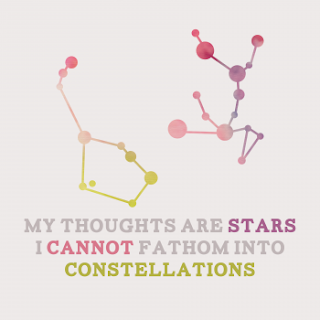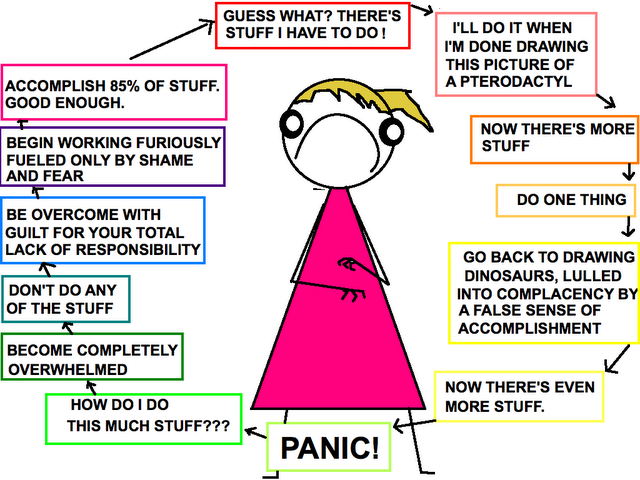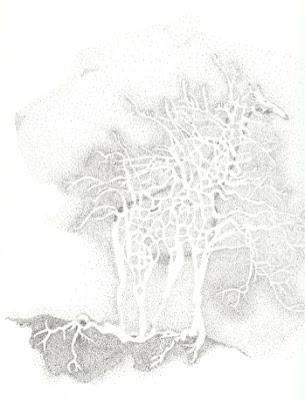 |
| Quote by John Green; poster by DFTBA. |
I used to love writing. I did it without thinking, did it as thinking: I organized all of my thoughts on paper, all of them. I journaled, I wrote poetry and fragments of stories, I reveled in research papers. I narrated my whole world, the real and the imaginary, on paper. Somewhere along the line, I lost that, and I have been fighting for years to get it back. For the most part, I have failed. Sometimes I find bursts of inspiration and begin scribbling again in one of the dozen or so notebooks I keep scattered around my house. Most of the time, though, I struggle to write anything at all. I stare at a blank page, a blank screen, for ages, and the words don't come. I get distracted, look away, have a hard time finding my way back. Working on my masters' degrees, I would often spend 20 hours or more on a few pages of writing that would previously have taken me maybe two or three hours.
The critical question is, what happened? Why the drastic change? I believe the issue is twofold: a combination of falling out of practice, and the wildly distracting effects of technology upon my magpie mind.*
After finishing my undergraduate degree, I moved across the country and took a job managing art house movie theatres. There was really no call for writing there, and although I did a bit in my spare time, I largely fell out of the habit. I regret that now, but it wasn't ultimately a tremendous drawback. After moving back to Tennessee, I returned to school for two semesters to earn a second bachelor's degree. It took some readjustment, but I fell back into the writing habit quickly enough. During a summer course on children's literature, I cracked out 20 pages in four days for a 10-page assignment, and would have happily kept writing had I not run up against the deadline. That paper led me, a few years later, to the MALS program, where I planned to continue following that thread which had so inspired me not long before.
In the meantime, however, something had changed. When the time came to write again, I ran straight into a wall. For everything I have tried to write since, I have to climb that wall -- sometimes once, sometimes repeatedly, three or four times for every page of writing I produce. It's frustrating. It's infuriating. For someone who has always dreamt of making a living as a writer, it's devastating.
 Allie Brosh, of the brilliant and highly relatable (to me) blog Hyperbole and a Half, says of her writing that "I've been known to sit in my toll-cave of a workspace for 18 hours in a row, for days on end, and work until I hate myself and whatever I'm working on. As you can imagine, this practice is not psychologically advisable, so I've been trying my best to avoid doing it too very often." She is entirely right about that, and I try too -- and yet somehow I continue to fail at avoiding to fall into the very same trap. More often, however, the magpie mind takes over, and I spend those 18 hours, days on end, thinking about the work I have to do -- while studiously avoiding it.
Allie Brosh, of the brilliant and highly relatable (to me) blog Hyperbole and a Half, says of her writing that "I've been known to sit in my toll-cave of a workspace for 18 hours in a row, for days on end, and work until I hate myself and whatever I'm working on. As you can imagine, this practice is not psychologically advisable, so I've been trying my best to avoid doing it too very often." She is entirely right about that, and I try too -- and yet somehow I continue to fail at avoiding to fall into the very same trap. More often, however, the magpie mind takes over, and I spend those 18 hours, days on end, thinking about the work I have to do -- while studiously avoiding it.
This is more or less exactly how I function when left to my own devices:
 |
| by Allie Brosh, via her blog Hyperbole and a Half |
I know, of course I know, that through avoidance I only hurt myself. You know it, too. The knowledge doesn't make it any easier to change, does it?
I was extremely fortunate in that 85% of my best was usually enough to earn me excellent marks on my assignments. That isn't particularly satisfying, though, when I know that I have done less than my best; and, moreover, I have made myself miserable in the process.
Although I don't have a great deal of advice to offer, here are a few strategies which served me well in my struggles to combat the magpie mind:
 |
| Huckleberry's implied label is 'To Pet.' |
2. Go old-school. Get away from the computer. Write first drafts by hand, on paper. Print out those articles and read them on paper, with a highlighter. Make marginal notes -- write down anything that comes to mind, whether you expect it to be useful or not. Print out your typed drafts to proofread them (I recommend doing this no matter how productive you are -- you'll spot things that are easily missed on the computer screen).
3. Change your setting. It can be hard to work in familiar environments, particularly at home, where there are always other things (or people, or, in my case, cats -- see photo evidence) demanding your attention. You might work better at the library -- there are private study rooms on most floors -- or at Starbucks. For me, I did my best work by combining these strategies: I printed out articles for my thesis and took them outside to read in my hammock.
 |
| Calliope is the priority here. Because she says so. |
4. Establish a goal-and-reward system. Finish this article, then allow yourself a few minutes online. Write a certain number of pages, then call a friend. Just be careful to limit the time you spend on the rewards.
 |
| In which Distraction prevails, via Wondermark. |
I imagine that, to some, this seems an impossible way to live, and particularly to work. And, in fact, it can be -- if you're trying to work in a field incompatible with the magpie mind. There are fields, however, that mesh beautifully with this mindset. Certain jobs require it. As a movie theatre manager, and in my recent other life, as a substitute teacher and school librarian, my need for active, ever-changing, multi-tasking work serves me exceptionally well.
Unfortunately, for me, online work is particularly incompatible with the way I function. I require activity, variety, and face-to-face human interaction. While I have thoroughly enjoyed working with you, reading your papers, and posting here for you these past few months, I quickly realized that this job and I are not very well-suited to each other. For that reason, you will have yet another new writing consultant in January. This post is my farewell missive. I will still be present (as myself, not as the MALS Writing Consultant) on the group Facebook page, but after today I will no longer have official access to that page, nor will I be the one replying to the Gmail account. I will miss getting to know your minds, your goals, and your words. I wish you all the very best of luck in your academic, personal, professional, and creative pursuits.
Cheers and best wishes,
Emily.
*"magpie mind" is my term for the way my brain functions:
all-too-easily distracted by shiny things. By anything, really.
 |
| via Keep-Calm-o-Matic |






















